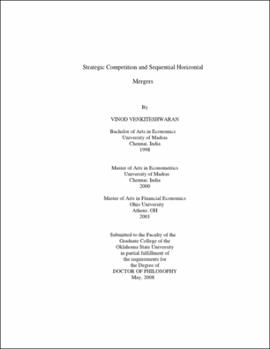| dc.contributor.advisor | Rao, Ramesh | |
| dc.contributor.author | Venkiteshwaran, Vinod | |
| dc.date.accessioned | 2013-11-26T08:23:57Z | |
| dc.date.available | 2013-11-26T08:23:57Z | |
| dc.date.issued | 2008-05 | |
| dc.identifier.uri | https://hdl.handle.net/11244/6764 | |
| dc.description.abstract | Findings and Conclusions: Temporally separated merger decisions within an industry may not necessarily be independent events. The literature on merger waves and casual observation attests to this fact. Fundamental economic shocks and cheaper capital are attributed as causes of this cascading effect in merger activity. See Harford (2004). Devoid of economic shocks will merger attempts by one firm encourage other firms to pursue similar strategies? Further, do firms anticipate rival reactions in making their own merger decisions? The principal idea in this study is that in oligopolistic settings, given that a merger has occurred in an industry, the likelihood that the initial merger will be followed by a sequential merger is conditional on the nature of merger induced externalities and the expected reaction of rival firms. When merger induced externalities are positive, the likelihood of a sequential merger is lower. I refer to this expectation as the 'Accommodation Hypothesis'. | |
| dc.description.abstract | The findings in this study are partially consistent with the 'Accommodation hypothesis'. Controlling for the type of competition in the product markets I find that the likelihood of sequential horizontal mergers is inversely related to the externality imposed on rival firms by an initial merger. I do not find evidence consistent with the stylized empirical results of Yan (2006), Carow, Heron and Saxton (2006) and others who find that early movers in merger waves are better off than late movers. The wealth effects for acquiring firms measured as their announcement period abnormal returns are not different between first and second stage acquisitions. These results for acquirer returns are not affected in multivariate settings and hence I conclude that overall the evidence is only partially consistent with strategic competition theory. | |
| dc.format | application/pdf | |
| dc.language | en_US | |
| dc.rights | Copyright is held by the author who has granted the Oklahoma State University Library the non-exclusive right to share this material in its institutional repository. Contact Digital Library Services at lib-dls@okstate.edu or 405-744-9161 for the permission policy on the use, reproduction or distribution of this material. | |
| dc.title | Strategic competition and sequential horizontal mergers | |
| dc.contributor.committeeMember | Harper, Joel | |
| dc.contributor.committeeMember | Jadlow, Joseph | |
| dc.contributor.committeeMember | Elliott, Bill | |
| dc.contributor.committeeMember | Polonchek, John | |
| osu.filename | Venkiteshwaran_okstate_0664D_2683.pdf | |
| osu.accesstype | Open Access | |
| dc.type.genre | Dissertation | |
| dc.type.material | Text | |
| dc.subject.keywords | horizontal mergers | |
| dc.subject.keywords | strategic competition | |
| dc.subject.keywords | oliogopoly | |
| thesis.degree.discipline | Business Administration | |
| thesis.degree.grantor | Oklahoma State University | |
